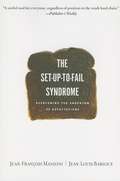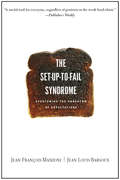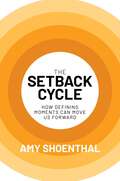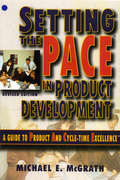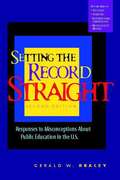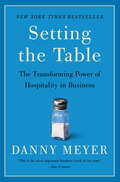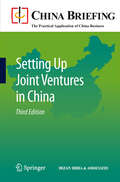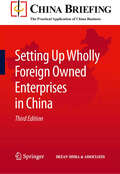- Table View
- List View
Set-Up-to-Fail Syndrome
by Jean-Louis Barsoux Jean-Francois ManzoniWhy do some employees perform poorly? Most managers would answer this question by ticking off a list that includes weak skills, insufficient experience, inability to prioritize assignments, or sometimes even a lack of motivation. In other words, most managers would contend that poor performance is the employee's fault. But is it? Not always, according to Jean-Francois Manzoni, assistant professor at INSEAD, and Jean-Louis Barsoux, research fellow at INSEAD. Their research with hundreds of executives strongly suggests that it is bosses themselves--albeit accidentally and with the best intentions--who are often responsible for an employee's sub-par achievement. They call this dynamic "The Set-Up-to-Fail Syndrome," and in this provocative look at what makes--and sustains--dysfunctional work relationships, the authors conclude with a detailed description of how to break out of the negative spiral that can drain both individuals and organizations of valuable productive energy.
Set-Up-to-Fail-Syndrome: Overcoming the Undertow of Expectations
by Jean-Francois Manzoni Jean-Louis BarsouxDo you have an employee whose performance keeps deteriorating-despite your close monitoring? Brace yourself: You may be at fault-by unknowingly triggering the set-up-to-fail syndrome. Perhaps things started off swimmingly. But then something--a missed deadline, a lost client-made you question the person's performance. You began micromanaging him. Suspecting your reduced confidence, he started doubting himself-and stopped giving his best. You viewed his new behavior as additional proof of mediocrity, and tightened the screws further. In The Set-Up-to-Fail Syndrome, Jean-Francois Manzoni and Jean-Louis Barsoux show how this insidious cycle hurts everyone: employees stop volunteering ideas, preventing your organization from getting the most from them; you lose energy to attend to other activities; and your reputation suffers as other employees deem you unfair. Team spirit wilts as targeted performers are alienated. But the set-up-to-fail syndrome doesn't have to happen. The authors provide preventive measures, such as loosening the reins as new employees master their jobs. If the syndrome has already erupted, Manzoni and Barsoux explain how to discuss the dynamic with your employee and reverse the cycle.
The Setback Cycle: How Defining Moments Can Move Us Forward
by Amy ShoenthalForbes contributor Amy Shoenthal&’s revolutionary strategies for working through life&’s inevitable setbacks, supported by research and personal stories from today&’s most prolific founders, leaders, and experts.How do you know if you&’re going through a setback? And once you realize you&’re in one, how do you work through it? Some of the world&’s most prominent leaders attribute their setbacks to the reason they found success. Their lowest moments paved the way for their creative rebirth. Through the four phases of The Setback Cycle—Establish, Embrace, Explore, and Emerge—Amy Shoenthal guides readers on how to make sense of their experiences, gain clarity on what comes next, and move confidently into future endeavors. That framework, developed through research and conversations with scholars, psychologists, neuroscientists, and executive coaches is supported through the deeply personal stories of founders and leaders like fashion icons Stacy London and Norma Kamali, fitness instructors Robin Arzón and Kendall Toole, chef Palak Patel, non-binary beauty influencer Cyrus Veyssi, and inspirational founders like Cate Luzio, Erica Taylor, Amanda Goetz, and more. Whether you&’re stuck in a rut after a breakup or trying to navigate an unexpected professional transition, The Setback Cycle offers guidance on how to take yourself through your toughest moments and forge a stronger path forward.
Setting Agendas in Cultural Markets: Organizations, Creators, Experiences (Routledge Research in Communication Studies)
by Philemon BantimaroudisThis book draws on agenda setting theory to examine how cultural organizations relate to media in order to increase their visibility, valence, and eventually build their public image. Most organizations have a keen interest in their symbolic presence, as their media visibility influences public knowledge, perceptions and even behaviors. Diminished public funding, in combination with the global proliferation of cultural entities, creates a competitive environment, leading to a transformation of cultural industries. In the book, several questions are under scrutiny: How do cultural organizations acquire symbolic significance? How do they become prominent in media content? Which mechanisms and processes should be examined by cultural managers as they set out to achieve salience? Is there a relationship between media and public salience? In other words, if an organization becomes symbolically prominent, in what ways is the public influenced, both in terms of perceptions as well as behaviors?
Setting Goals that Others Will Pursue: Committing to an Outcome
by Richard LueckeBy setting goals and measuring their achievement, you can focus on what is most important, waste less energy on noncritical tasks, and achieve greater results. Whether your organization takes a top-down approach to goal setting or a bottom-up one, you are responsible for setting goals for your unit and for yourself. This chapter breaks down the priorities, the obstacles, and the after-action review of goal setting and achieving.
Setting Goals with LEGO® SERIOUS PLAY®: A Proven Approach for Forward-Thinking Organizations (Business Guides on the Go)
by Reinhard Ematinger Matthias Renner Sandra SchulzeIn this book, readers will discover how Objectives and Key Results (OKRs) unlock a company's full potential by providing a transformative framework that clarifies strategic tasks and fosters transparent communication throughout the organization. Aligning mission statements with goals and key metrics, OKRs drive exceptional performance. Built around two fundamental questions—Where does the company want to go? How does it get there?—OKRs infuse purpose and direction. Goals inspire and motivate, while key results provide measurable milestones for self-organized achievement. Harnessing the power of the LEGO® SERIOUS PLAY® method, the book guides facilitators and teams through defining, implementing, and evaluating OKRs with creativity and collaboration. It emphasizes leveraging the collective knowledge and experience of the team to set achievable objectives and drive tangible results. Whether one is a facilitator or a team member, the book advocates for a hands-on approach to OKRs. With practical manuals and proven strategies, organizations can accelerate change and foster a culture of success. Welcome to a new era of structured, speedy, and enjoyable goal-setting.
Setting Profitable Prices
by Marlene JensenTime-tested strategies for making the best possible pricing decisions and gaining an unbeatable competitive advantagePricing is one of the most important--and difficult--marketing problems companies face when launching new products. Unfortunately, the research that goes into making optimal pricing decisions is a very time-consuming process--unless, that is, you can afford to pay a consultant or outside agency to do it for you. But if you're like most small- to medium-sized business owners and managers, time and money are two things you absolutely don't have to spare. Problem solved: Written by a nationally recognized pricing expert, this book arms you with proven strategies for guaranteeing that you'll never again leave money on the table when determining prices. And you'll spend the least possible time setting your more profitable prices.Packed with valuable worksheets and other valuable tools to help guide your research and your pricing decision-makingA goldmine of expert tips for pricing in any specialty market, it offers a highly effective way to market your company's product more effectively and profitablyShows you how to avoid making your competitors' pricing mistakes and gain a powerful competitive edge in the processThe author uses examples drawn from her years of consulting work with companies large and small, including Food Network, American Express Publishing, and Playboy
Setting Sail into the Age of Digital Local Government: Trends and Best Practices (Public Administration and Information Technology #21)
by Tony E. Wohlers Lynne Louise BernierThe Internet and related technologies have dramatically changed the way we live, work, socialize, and even topple national governments. As the Internet becomes increasingly pervasive across societies, we find more often that governments adopt Information Communication Technologies (ICTs) as part of their toolbox for facilitating efficient and citizen-oriented service delivery at all levels of government. Local governments across the major industrialized democracies have not been an exception to this trend and have set sail into the age of digital government. Closest to their citizens, towns and cities have adopted ICTs to facilitate electronic government (e-government). While research on local e-government functionality in terms of information dissemination, service delivery, and citizen engagement continues at an impressive empirical and methodological pace, gaps in our knowledge remain. Cross-national comparative research on local e-government that covers a wide range of municipalities in combination with in-depth case study analyses is lacking. Informed by a comparative case study approach, this book seeks to narrow that gap and offer practical policy solutions to facilitate local e-government. We do so by pursuing both a macro and micro perspective of e-government functionality in the federal republics of Germany and the United States and unitary France and Japan. The macro perspective focuses on the state and scope of e-government functionality across a large number of randomly selected municipalities of all sizes in these advanced industrialized countries. Based on a small sample of case studies, the micro perspective analyzes the successful implementation of e-government in Seattle (United States), Nuremberg (Germany), Bordeaux (France), and Shizuoka City (Japan).
Setting the PACE in Product Development
by Michael E. McGrathSetting the PACE in Product Development describes how to effectively manage the key ingredients of successful product development: time, quality, talent and resources. This revised edition of Product Development provides essential insight as to how to efficiently organize people, resources and processes to dramatically improve financial results, strategic positions, internal morale and customer satisfaction. The PACE techniques integrate vital company-wide functions, engaging the entire company and focusing its collective energy on strategically and financially important goals.
Setting the Record Straight: Responses to Misconceptions About Public Education in the U.S.
by Gerald W. BraceyIn this second and substantially updated edition of the hard-hitting Setting the Record Straight, Bracey, whom Washington Post education reporter Jay Mathews called "one of this country's most authoritative defenders of the work of public school teachers," goes toe-to-toe with the opponents of quality public education. You'll learn how to discredit them in your own discussions by using the very logic and statistical analyses they purport to have on their side.
Setting the Stage: The Expectations of New Managers and Those Around Them and Defining the Managerial Role
by Linda A. HillThe promotion to manager is a pivotal juncture in your career. The transition from individual contributor to manager, however, is difficult. Author Linda A. Hill followed nineteen new managers through their first year, gathering data about the managerial transition. Her interviews revealed that the expectations of new managers almost always conflict with the expectations of those around them, giving rise to unexpected challenges that can throw even the most eager and motivated recruits for a loop. This chapter examines the conflicting expectations of new managers, their subordinates, their superiors, and their peers, demonstrating the difficulty of defining the managerial role in the first place and learning how to become a manager given the demands of various constituencies. This chapter was originally published as Chapter 1 of "Becoming a Manager: How New Managers Master the Challenges of Leadership."
Setting the Table: The Transforming Power of Hospitality in Business
by Danny MeyerIn October 1985, at age twenty-seven, Danny Meyer, with a good idea and scant experience, opened what would become one of New York City's most revered restaurants--Union Square Cafe. Little more than twenty years later, Danny is the CEO of one of the world's most dynamic restaurant organizations, which includes eleven unique dining establishments, each at the top of its game. How has he done it? How has he consistently beaten the odds and set the competitive bar in one of the toughest trades around?In this landmark book, Danny shares the lessons he's learned while developing the winning recipe for doing the business he calls "enlightened hospitality." This innovative philosophy emphasizes putting the power of hospitality to work in a new and counterintuitive way: The first and most important application of hospitality is to the people who work for you, and then, in descending order of priority, to the guests, the community, the suppliers, and the investors. This way of prioritizing stands the more traditional business models on their heads, but Danny considers it the foundation of every success that he and his restaurants have achieved. Some of Danny's other insights:Hospitality is present when something happens for you. It is absent when something happens to you. These two simple concepts--for and to--express it all.Context, context, context, trumps the outdated location, location, location.Shared ownership develops when guests talk about a restaurant as if it's theirs. That sense of affiliation builds trust and invariably leads to repeat business.Err on the side of generosity: You get more by first giving more.Wherever your center lies, know it, name it, believe in it. When you cede your core values to someone else, it's time to quit.Full of behind-the-scenes history on the creation of Danny's most famous restaurants and the anecdotes, advice, and lessons he has accumulated on his long and ecstatic journey to the top of the American restaurant scene, Setting the Table is a treasure trove of innovative insights that are applicable to any business or organization.
Setting the Virtuous Flywheel in Motion: Understanding the Critical Role of Great Leaders in Realizing the Potential of Their People
by Justin MenkesYour identity as an executive-level leader is dependent on the environment you create within your organization: you can't separate out your success or failure from the people you lead or the culture you've engendered. In this chapter, Justin Menkes, a noted expert in executive assessment, profiles a maestro CEO--Dave Dillon, head of supermarket giant Kroger--showing how Dillon's organization exemplifies the ongoing interactive system great leaders cocreate with their people. In his leadership, Dillon demonstrates the three attributes necessary to a great leader and how they have transformed both his organization and Dillon himself: realizing potential, subservience to purpose, and finding order in chaos. These are the attributes you need to succeed as a great leader in the high-pressure global economy of the twenty-first century. This chapter was originally published as Chapter 8 of "Better Under Pressure: How Great Leaders Bring Out the Best in Themselves and Others."
Setting up a Sovereign Wealth Fund: Some Policy and Operational Considerations
by Udaibir S. Das Yinqiu Lu Christian Mulder Amadou SyA report from the International Monetary Fund.
Setting up a Successful Photography Business: How To Be A Professional Photographer
by Lisa PritchardSetting up a Successful Photography Business is a practical and essential handbook for anyone who wants to be a professional photographer. Written by the owner of a successful photography agency, it is packed full of helpful information and invaluable advice from not only the author but also many leading photographers and commissioners working in all areas of the industry today. This book includes all the essentials- how to prepare the best portfolio and website; how to market yourself and get clients; how to cost and produce shoots; how to find representation; how to finance and run your business; how to deal with contracts and legal obligations plus much more. It also contains lots of useful checklists, charts and handy business templates- everything you need to know to get your own photography business off to flying start.
Setting Up a Successful Photography Business
by Lisa PritchardThis revised second edition of the best-selling handbook provides practical, actionable insights on how to establish a successful photography business in the current climate. Written from the perspective of a photographer's agent, this book offers the perfect viewpoint to honestly assess what works, what doesn't, and why some photographers succeed where others fail. Packed with useful templates and advice from leading photographers and commissioners working in all areas of the profession today, industry expert Lisa Pritchard covers all of the essentials: preparing the best portfolio and website; marketing yourself; getting clients; costing and producing shoots; finding representation; financing and running your business; navigating contracts and legal obligations; and more. Updated to take account of shifts in the industry and the increasing importance of digital marketing and social media, this book provides fresh insight and inspiration for the budding and established professional. This book is essential reading for anyone who wants to be a professional photographer – whether studying to become one, thinking of a change of career, or wanting to know how to improve their existing photography business.
Setting Up and Running Effective Staff Appraisals, 7th Edition: and Feedback Review Meetings
by Dr. Nigel HuntRegular staff reviews will help an organisation to be effective and efficient (and hence more profitable), and will help the individual employee gain more job satisfaction. A satisfied employee is going to work better; a more profitable company means a happier boss. It's that simple. This book is a thorough, comprehensive guide for anyone involved in staff reviews. It covers: *Conducting appraisals in an open organisation with a narrative focus *Appraisal skills - interview techniques and listening and counselling skills *Eight rules for successful negotiation *The role of job analysis, job description and person specification *Different types of appraisal *Preparing for the appraisal * Conducting the interview and evaluating the appraisal *What can go wrong and what to watch out for *Resolving conflict. Thoroughly revised and updated edition.
Setting Up Joint Ventures in China
by Andy Scott Sam Woollard Chris Devonshire-EllisThis brand new guide book is a comprehensive overview of establishing joint ventures in China. It details all applicable decision making processes such as assessing your potential partner, choosing the relevant JV structure, conducting legal and financial due diligence. The guide contains complete JV contract and articles of association as well as an overview of JV law, details negotiation issues, land use rights, IP Protection and technology transfer, in addition to tips on staff hiring and HR. It also describes the tax and audit responsibilities in addition to buying out a JV partner and liquidations. It is a concise, detailed yet pragmatic guide of use to anyone considering or owning a JV in China.
Setting Up & Operating a Business in Japan
by Helene Thian"A unique handbook, speaking to the key issues and drawing on the experiences of veterans at the Japan business game." --James C. Abegglen, Cofounder, Boston Consulting GroupMore and more foreign-owned businesses are set up in Japan every year-and dozens fail because they are not set up properly. Now, an American lawyer working in Tokyo has written this new, compact handbook that will give you all the information you need to get your business off the ground and keep it there. Packed with business tips, legal information, interviews with successful foreign business people, and insider perspectives on Japanese business practices, this book is essential for the entrepreneur, the foreign enterprise representative, or anyone who wants to build a successful business in the world's most competitive marketplace.Topics of Setting up and Operating a Business in Japan include: Working with the Japanese. Forming a Company. Financing. Taxation. Visas. Employees. Cost of Doing Business. Advertising. Pros and Cons of Being a Foreign Business. Business Advice. Business Organizations. Professional Clubs. Helpful Organizations. Communication Services
Setting Up & Operating a Business in Japan
by Helene Thian"A unique handbook, speaking to the key issues and drawing on the experiences of veterans at the Japan business game." --James C. Abegglen, Cofounder, Boston Consulting GroupMore and more foreign-owned businesses are set up in Japan every year-and dozens fail because they are not set up properly. Now, an American lawyer working in Tokyo has written this new, compact handbook that will give you all the information you need to get your business off the ground and keep it there. Packed with business tips, legal information, interviews with successful foreign business people, and insider perspectives on Japanese business practices, this book is essential for the entrepreneur, the foreign enterprise representative, or anyone who wants to build a successful business in the world's most competitive marketplace.Topics of Setting up and Operating a Business in Japan include: Working with the Japanese. Forming a Company. Financing. Taxation. Visas. Employees. Cost of Doing Business. Advertising. Pros and Cons of Being a Foreign Business. Business Advice. Business Organizations. Professional Clubs. Helpful Organizations. Communication Services
Setting Up Representative Offices in China
by Andy Scott Sam Woollard Chris Devonshire-EllisDo you want to do business in China? If you are already in this vast country and want to know more, or if you have never tried your hand at this fascinating market, then this book is for you. This Guide is a practical overview for the international businessman to understand the rules, regulations and management issues regarding establishing Representative Offices in China. We will help you to understand the implications of what can initially appear be a complicated and contradictory subject. This book tells you the basics of what you need to know, and point you at the structures you should use as well as some of the pitfalls. This book is the first in a new series of books on doing business in China, which will progressively cover such topics as setting up wholly foreign-owned enterprises, setting up joint ventures, tax, IP and many other vital issues for foreign investors in this exciting market.
Setting Up Shop
by John StanleyRetailing is one of the most exciting professions you can enter. In Australia, this dynamic and growing industry is worth over $18 billion a year. Many new enterprises fail because they do not do their homework when they start their business. Setting Up Shop is a toolkit for anyone starting or buying a retail business in Australia, and aims to provide a simple step-by-step approach to setting up a retail business. It covers everything from buying an existing business versus starting a business, writing a business plan, location and buying versus leasing, to finance, pricing, merchandising, recruiting, marketing and succession planning.
Setting Up Treasuries in the Baltics, Russia, and Other Countries of the Former Soviet Union
by Barry H. Potter Jack DiamondThis summary presents the results of an internal self-evaluation of the technical assistance provided by the IMF to help develop treasuries in the Baltics, Russia, and other countries of the former Soviet Union. 1 The findings from the assessment are intended principally for those interested in the development of these transition economies, but should also be of wider relevance to those involved in delivering technical assistance on public sector institutional reform. The assessment follows the standard approach to such evaluation work. It first considers whether the basic goal of setting up treasuries has been achieved and whether the resultant reforms are relevant and sustainable. Then, it reviews the costs of the inputs, the outputs, the efficiency with which the technical assistance was delivered, and the effectiveness of the particular program. The assessment also considers the factors that influenced the relative efficiency, effectiveness, and impact of the program in different countries. Finally, the work on the treasury systems is viewed in the wider context of budget and fiscal management in these economies, and some conclusions are drawn about the need for and targeting of further technical assistance in these areas.
Setting Up Wholly Foreign Owned Enterprises in China
by Andy Scott Sam Woollard Chris Devonshire-EllisDo you want to manufacture or trade in China? If you are looking at investing in a China manufacturing or service operation in China, then this book is for you. This Guide is a practical overview for the international businessman to understand the rules, regulations and management issues regarding establishing wholly foreign owned enterprises in China. We will help you to understand the implications of what can initially appear be a complicated and contradictory subject. This book tells you the basics of what you need to know, and point you at the structures you should use as well as some of the pitfalls. This book is the second in our new series of books on doing business in China, which will progressively cover such topics as setting up joint ventures, tax, IP and many other vital issues for foreign investors in this exciting market.
Setting Your North Star and Initiating the TEN Cycle: The Tools for Implementation--Incorporating Sustainability into Your Core Business
by Adam WerbachIn order to be effective--and profitable--your sustainability efforts must serve core customer needs and reflect core business goals and values. Your company must develop general goals--what the author calls "North Star" goals--to guide the whole organization toward executing a strategy for sustainability. This chapter looks at how companies like P&G and Stonyfield Farm determined their North Star goals and identified the initial actions necessary to mobilize their people, increase transparency, and engage their whole networks of suppliers, customers, and community even before deciding which product, service, or other idea to pursue. This chapter was originally published as chapter 3 of "Strategy for Sustainability: A Business Manifesto."
